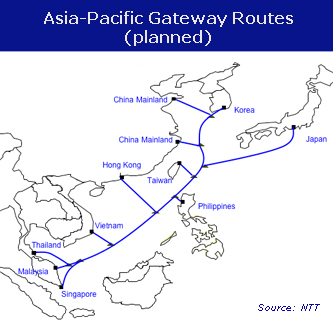Facebook is betting that “if they build it, they will come!” The company is waging that a better user experience will boost customers in Asia — already its fastest-growing market — by transforming 10,000km of cable into a “field of dreams” for Internet users.
Facebook, as part of a consortium, is making a RM1.4 billion investment in the Asia-Pacific Gateway (APG), an underwater, fibre-optic network that will start in Malaysia and run to South Korea and Japan, with links branching off to other countries. The cable will boost connectivity speeds throughout the region and lower dependency on Singapore as a bandwidth gateway.
The new cable will connect to Malaysia’s already in-place sophisticated broadband network that reaches 62.9 per cent of the country. Without this cutting edge functionality already in place, it’s possible another country could have edged us out as host of the cable’s starting position.
The APG is expected to help the region send and receive information from the United States at breakneck speed and give Facebook a new infusion of “friends.”
A spokesperson for Facebook said about the deal, “Our investment in this cable will help support our growth in South Asia, making it possible for us to provide a better user experience for a greater number of Facebook users in countries like India, Indonesia, Malaysia, the Philippines, Hong Kong, and Singapore.”
But, at this point, Facebook needs Asia more than the other way around. Its first quarter earnings showed slowing growth and the public will get a glimpse of how bad things are for the social network company when it releases its second quarter earnings later this month.
Malaysia’s positive track record working with China helped position it as a leader in this deal. Two Chinese Internet providers — China Telecom and China Unicom — largely fund the APG. But the Asia-Pacific Gateway also benefits a company closer to home.
The Malaysian telecommunications company, TIME dotCom (TdC), announced that its subsidiary, Global Transit, would administer the APG. This advance helps cement the company’s position as a key international bandwidth provider.
As the head of Global Transit, Saiful Husni, points out, “An advantage is that we have a global network system landing directly into Malaysia. This lowers our dependencies on Singapore as the main gateway for Internet traffic. We can now channel high volumes of this traffic on our network with the lowest latency, directly to the US.”
Facebook isn’t the only American-based Internet player to walk the talk. Google, the Internet search company, announced in 2008 that it would invest in a RM952 million undersea cabling system called Unity between Asia and the US.
Construction work on APG is expected to start in the second half of 2012, with the cable system scheduled to be ready for service in the third quarter of 2014.

